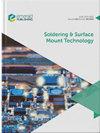Automatic optical inspection system for IC solder joint based on local-to-global ensemble learning
IF 1.8
4区 材料科学
Q3 ENGINEERING, ELECTRICAL & ELECTRONIC
引用次数: 2
Abstract
Purpose Automatic optical inspection (AOI) systems have been widely used in many fields to evaluate the qualities of products at the end of the production line. The purpose of this paper is to propose a local-to-global ensemble learning method for the AOI system based on to inspect integrated circuit (IC) solder joints defects. Design/methodology/approach In the proposed method, the locally statistically modeling stage and the globally ensemble learning stage are involved to tackle the inspection problem. At the former stage, the improved visual background extraction–based algorithm is used for locally statistically modeling to grasp tiny appearance differences between the IC solder joints to achieve potential defect images for the subsequent stage. At the latter stage, mean unqualified probability is introduced based on a novel ensemble learning, in which an adaptive weighted strategy is proposed for revealing different contributions of the base classifier to the inspection performance. Findings Experimental results demonstrate that the proposed method achieves better inspection performance with an acceptable inspection time compared with some state-of-the-art methods. Originality/value The approach is a promising method for IC solder joint inspection, which can simultaneously grasp the local characteristics of IC solder joints and reveal inherently global relationships between IC solder joints.基于局部到全局集成学习的集成电路焊点自动光学检测系统
目的自动光学检测(AOI)系统已被广泛应用于许多领域,用于在生产线末端评估产品的质量。本文的目的是提出一种基于检测集成电路焊点缺陷的AOI系统的局部到全局集成学习方法。设计/方法论/方法在所提出的方法中,涉及局部统计建模阶段和全局集成学习阶段来解决检查问题。在前一阶段,使用改进的基于视觉背景提取的算法进行局部统计建模,以掌握IC焊点之间的微小外观差异,从而为下一阶段获得潜在缺陷图像。在后一阶段,基于一种新的集成学习引入了平均不合格概率,其中提出了一种自适应加权策略,以揭示基本分类器对检测性能的不同贡献。实验结果表明,与一些最先进的方法相比,该方法在可接受的检测时间内实现了更好的检测性能。独创性/价值该方法是一种很有前途的IC焊点检测方法,它可以同时掌握IC焊点的局部特征,并揭示IC焊点之间固有的全局关系。
本文章由计算机程序翻译,如有差异,请以英文原文为准。
求助全文
约1分钟内获得全文
求助全文
来源期刊

Soldering & Surface Mount Technology
工程技术-材料科学:综合
CiteScore
4.10
自引率
15.00%
发文量
30
审稿时长
>12 weeks
期刊介绍:
Soldering & Surface Mount Technology seeks to make an important contribution to the advancement of research and application within the technical body of knowledge and expertise in this vital area. Soldering & Surface Mount Technology compliments its sister publications; Circuit World and Microelectronics International.
The journal covers all aspects of SMT from alloys, pastes and fluxes, to reliability and environmental effects, and is currently providing an important dissemination route for new knowledge on lead-free solders and processes. The journal comprises a multidisciplinary study of the key materials and technologies used to assemble state of the art functional electronic devices. The key focus is on assembling devices and interconnecting components via soldering, whilst also embracing a broad range of related approaches.
 求助内容:
求助内容: 应助结果提醒方式:
应助结果提醒方式:


